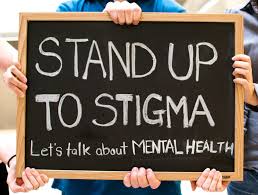 I estimate on any given Sunday, 25% of my congregation struggles with mental or emotional health. Another 10% is struggling but unsure or uncomfortable addressing the issues they see or feel. I am the pastor of a vibrant, small congregation in central NJ. I am not a professional therapist. The estimate above is based on the data I have collected while providing pastoral care. In any given week, I have dozens of conversations with people about their lives, their relationships, their families, their jobs, their joys and their concerns. Sometimes I have these conversations in a formal setting, a scheduled appointment in my study. But most of the time, these conversations happen more informally. A woman hugs me after worship and says, “I've been really depressed this week. I almost didn't make it to church. Pray for me.” A man stands next to me when pouring coffee at fellowship time. I ask how he is doing with his brother's death. I know from previous conversations that he struggles with anxiety. He answers by saying, “my doctor upped my meds and I'm doing ok.” Or I notice someone's facebook status indicating that today is not a good day, I comment with encouragement, prayer and an offer to listen. Whether in my study, in the receiving line after worship, during fellowship time or on facebook, the bulk of pastoral care that I provide deals with mental and emotional health. Depression, Anxiety, Bi-polar disorder, Schizophrenia, Borderline personality disorder, and Addiction are all represented in our sanctuary. The numbers above do not include those who are not neurotypical, like those on the Autism Spectrum (ASD) or those with Attention Deficit Disorder (ADD). Yet the stresses on families and individuals dealing with complex medical and mental conditions like ASD or ADD are included in the numbers above. This is not just my congregation; it's yours too. We need to get rid of the stigma associated with mental illness. We need to talk about mental and emotional health – from the pulpit. One Sunday, I did just that. I told my congregation from the pulpit, “on any given Sunday 25% of our congregation struggles with mental or emotional health.” This statement allowed us to begin accepting one another, supporting one another, caring for one another. Our deacons can now engage in conversation with people about therapy and medication, support groups and hospitalization. If we can accept that people struggle with brain chemistry and emotional stability, we can be intentional about the way we care for one another. We can begin to do our part and allow professionals to do their part. And in the best case scenario, we will work together. I feel joy when I get to refer a congregant to a trusted therapist. It means we're growing up. I am humbled when I am allowed to support a family as they send a loved one off to rehab after a lapse in sobriety. It means we are fragile. I am honored when a congregant gives me permission to speak to a service provider so that our congregation can support him or her in health. I don't want the church to be mental health professionals. I want us to be a community of believers who love one another the best we can and with all of the resources at our disposal. The scriptures don't speak directly to mental illness. However, Jesus most definitely addresses mental and emotional unrest. We have a story about the Gerasene demoniac (Mark 5) whose healing affected the economic stability of an entire town. It was as if Jesus used the pigs to pay for the appropriate treatment. Perhaps we don't talk about mental illness because we don't want to deal with the financial inequity in our world regarding healthcare in general. We have a story about a man with “seizures” in the NRSV but who is called a “lunatic” in the NASV (Matthew 17). His healing is an opportunity for Jesus to rebuke his followers for a lack of faith. Perhaps we don't talk about mental illness because we aren't comfortable with how chronic illnesses affect our faith. We have a story about anxiety; “Martha, Martha, you are worried and anxious about many things,” says Jesus (Luke 10). His treatment plan was for her to recognize the value in stopping work. Perhaps we don't talk about mental illness because we prefer to be busy and sabbath seems unrealistic. Mental and emotional unrest is complex and the available treatment is equally complex. These texts ring true, in that once our congregation began to talk about mental illness, we were also faced with the economics of healthcare, the struggle for faith amidst chronic illnesses and the need for sabbath. We began to swim in a sea of complex issues that affected those we loved. We started looking a whole lot messier. But the truth was, we were already that messy; we just weren't talking about it. 25-35% of the people who walk through the doors of our churches are struggling with mental and emotional health. Let's start talking about it so that God can help us love one another the best we can with all of the resources at our disposal. 10/24/2019 06:26:29 pm
A lot of people have been struggling to talk about their mental health problems because they are hesitant that no one will have the interest to listen. Well, I do understand where all of these are coming from. Our society is not yet open with the idea that mental health problems are risky and a serious problem. Most of the time, we think it's not and we could just get over it. That's not real! Just like any other health problems, mental health problems need to be addressed as soon as possible! Comments are closed.
|
Books I'm currently reading:Archives
April 2022
Categories |

 RSS Feed
RSS Feed








